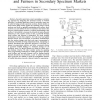Free Online Productivity Tools
i2Speak
i2Symbol
i2OCR
iTex2Img
iWeb2Print
iWeb2Shot
i2Type
iPdf2Split
iPdf2Merge
i2Bopomofo
i2Arabic
i2Style
i2Image
i2PDF
iLatex2Rtf
Sci2ools
141
click to vote
INFOCOM
2011
IEEE
2011
IEEE
Strategyproof auctions for balancing social welfare and fairness in secondary spectrum markets
Abstract—Secondary spectrum access is emerging as a promising approach for mitigating the spectrum scarcity in wireless networks. Coordinated spectrum access for secondary users can be achieved using periodic spectrum auctions. Recent studies on such auction design mostly neglect the repeating nature of such auctions, and focus on greedily maximizing social welfare. Such auctions can cause subsets of users to experience starvation in the long run, reducing their incentive to continue participating in the auction. It is desirable to increase the diversity of users allocated spectrum in each auction round, so that a trade-off between social welfare and fairness is maintained. We study truthful mechanisms towards this objective, for both local and global fairness criteria. For local fairness, we introduce randomization into the auction design, such that each user is guaranteed a minimum probability of being assigned spectrum. Computing an optimal, interference-free spectrum allocation i...
Communications | Fairness Criterion | INFOCOM 2011 | Linear Programming Techniques | Spectrum Scarcity |
| Added | 30 Aug 2011 |
| Updated | 30 Aug 2011 |
| Type | Journal |
| Year | 2011 |
| Where | INFOCOM |
| Authors | Ajay Gopinathan, Zongpeng Li, Chuan Wu |
Comments (0)

